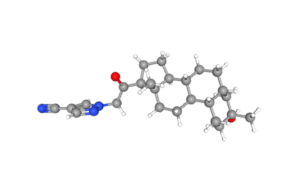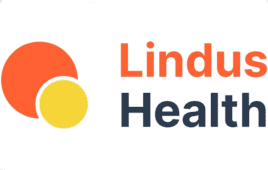
[Adobe Stock]
Zurzuvae, a new PPD treatment option

Zuranolone molecule image from PubChem
Among Time’s top pharma inventions 2023 is Zurzuvae, which won FDA approval in August 2023 as a treatment option for postpartum depression (PPD). Before the approval, PPD options were generally limited to traditional antidepressants and Zulresso (brexanolone), a structurally similar drug to Zurzuvae that requires a 60-hour intravenous infusion. By contrast, zuranolone is an oral drug.
Arexvy, the first FDA-approved RSV vaccine
In May, GSK’s Arexvy became the first RSV vaccine to win FDA approval. Specifically covering adults 60 and older, Arexvy remains the market-leading RSV vaccine. GSK aims to expand approval of its Arexvy to adults aged 50-59 based on encouraging phase 3 data showing comparable immune response to those 60 and up.
Type 2 diabetes and obesity megablockbuster semaglutide
 First approved as Ozempic for type 2 diabetes management in 2017, Novo Nordisk’s semaglutide has emerged as a juggernaut more recently. Two years later, the FDA approved an oral version of the drug for the same indication. In 2020, FDA expanded Ozempic’s use to include cardiovascular risk reduction in patients with type 2 diabetes. An Ozempic approval in 2022 followed for higher-dose semaglutide for increased glycemic control for the same patient population. But the drug’s FDA approval as Wegovy in 2021 for chronic weight management
First approved as Ozempic for type 2 diabetes management in 2017, Novo Nordisk’s semaglutide has emerged as a juggernaut more recently. Two years later, the FDA approved an oral version of the drug for the same indication. In 2020, FDA expanded Ozempic’s use to include cardiovascular risk reduction in patients with type 2 diabetes. An Ozempic approval in 2022 followed for higher-dose semaglutide for increased glycemic control for the same patient population. But the drug’s FDA approval as Wegovy in 2021 for chronic weight management
has catalyzed a strong surge in sales demand, helping make Novo Nordisk Denmark’s biggest company.
Tzield, first disease-modifying therapy for type 1 diabetes
Also earning its place on Time’s Top Pharma Inventions 2023 is Tzield (teplizumab-mzwv), which can delay the onset of type 1 diabetes. A humanized monoclonal antibody that targets CD3 on T cells, the drug from Provention Bio is the first disease-modifying therapy for type 1 diabetes. Its price tag of nearly $200,000 for the full 14-day course of treatment has raised affordability concerns. Provention has partnered with Sanofi to commercialize the therapy and has developed an access program.
Leading light in Alzheimer’s management

Conceptual representation of neurons [Adobe Stock]
Ember Cube offers a sustainable option for cold-chain biologics transport

Ember Cube
Cardinal Health partnered with temperature control firm Ember Technologies to develop the Ember Cube, a reusable self-refrigerated shipping container, to distribute temperature-sensitive biologics. The product maintains precise temperature control and provides real-time tracking of metrics such as temperature and location via cloud-connected IoT sensors. Cardinal Health sees potential in the Ember Cube to reduce waste from traditional cold-chain shippers while enabling greater visibility into products in transit.
The first vaccine for insects
A new vaccine for American foulbrood disease in honey bees has won conditional licensure from the USDA, marking the first vaccine for insects. The vaccine from Dalan Animal Health is not injected. Instead, it’s a novel oral vaccine that is mixed with queen candy — a sugary food for the queen bee. Afterwards, when the queen ingests this mixture, it supports the transfer of the vaccine’s protective elements to her eggs. The vaccine provides protection for the hive as the vaccinated queen’s eggs develop into larvae that are innately equipped to combat the foulbrood bacteria that causes the contagious and often fatal disease. With foulbrood infecting up to 25% of hives in some areas and managed hives critical for pollinating one-third of U.S. fruits and vegetables, the widespread adoption of the vaccine could support agricultural health and the sustainability of beekeeping practices.
Filed Under: Biologics, Metabolic disease/endicrinology, Neurological Disease



